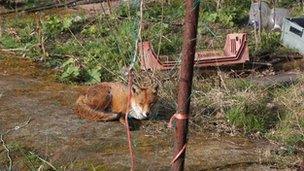Fox attacked baby boy in own home, police say
- Published

A four-week-old baby boy was attacked by a fox in his home in south London, the Metropolitan Police have said.
He was treated for a hand injury and taken to St Thomas' Hospital after the attack on 6 February in the borough of Lewisham.
London Mayor Boris Johnson said: "This sort of attack, though terrible, is rare, but we must do more to tackle the growing problem of urban foxes."
Police said their inquiries into the incident were continuing.
St Thomas' Hospital is not commenting on the incident.
But the BBC's John Andrew said: "The mother was at home and heard this awful scream, went next door where the baby was, found it had been dragged from the cot onto the floor and the baby's hand was in the jaws of the fox.
"She was obviously in a terrible panic and did what she could to get the fox off, including kicking it. Eventually it did let go but the baby was found with quite serious injuries."
Our correspondent said it was believed one of the baby's fingers was severed but later re-attached by surgeons in a "delicate and difficult" three-hour operation, although it has not been confirmed by the hospital.
Mr Johnson said his thoughts were "with the baby boy and his family".
He added: "They may appear cuddly and romantic but foxes are also a pest and a menace, particularly in our cities.
"This must serve as a wake up call to London's borough leaders, who are responsible for pest control.
"They must come together, study the data, try to understand why this is becoming such a problem and act quickly to sort it out."
Mr Johnson has previously urged councils to take action over foxes following an attack in 2010 in which two baby sisters were mauled while sleeping at their home in Hackney, east London.
Opinion divided
Both had to undergo surgery and were left scarred by the attack. Isabella Koupparis suffered arm injuries while her twin Lola suffered injuries to both her face and arm.
Richard Moseley, from the British Pest Control Association, told the BBC attacks by foxes inside a house were "incredibly rare".
Richard Mosley, British Pest Control Association: Fox attacks on humans 'very rare'
He said: "What we are finding is that as people feed foxes and encourage foxes to come closer to their properties... they are becoming tamer and people do have to remember that at the end of the day they are still a wild animal."
Asked whether there would be calls for a cull, he said: "A cull would be very expensive and an awful lot of work. Public opinion is very divided over foxes. If you ask the public there is probably a 50/50 split between those who love them and those who want them eradicated."
An RSPCA spokeswoman also said it was extremely unusual for foxes to attack people, and that the animal would only do so if it was afraid.
She added: "It's not typical fox behaviour at all. Foxes will come closer to a house if there are food sources. Then they can become quite bold, but they usually do back off and run away when there's people around."
A Lewisham Council spokesperson said: "Although rare, fox attacks can be devastating as this tragic case shows and our thoughts go out to the family at this difficult time.
"Local authorities and animal welfare organisations have been advising residents on ways to make their homes and back gardens less attractive to foxes. These can include repellents and making sure that waste food is always disposed of in secure, lidded bins and containers.
"Residents should always be careful when leaving doors and windows open. We must all do this together for it to be effective in discouraging foxes from our neighbourhoods."
- Published9 September 2010
- Published9 September 2010